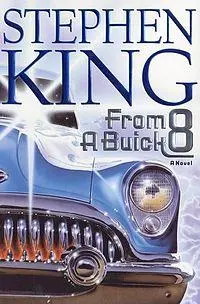Header image via Simon & Schuster Dark Tower box set
CONTAINS SPOILERS:
Stephen King has proliferated the cultural landscape with monsters, killers, and ghosts of all varieties throughout his abundant body of work, but when you’ve knocked out over sixty novels and countless short stories, sometimes the villain pool gets a little shallow.
The King villain factory has churned out some, ahem, unique takes, from haunted laundry machines to random-ass fingers that emerge from the sink drain. However, those are short stories, where's it's cool to experiment, and you aren't required to deliver the same payoff as a novel. If something doesn't work, no big deal, that's only fifteen wasted pages for Constant Reader.
Now, consider reading a big novel like Under the Dome and learning that the villains are adolescent “leatherhead” aliens that are “just fucking with you, bro” for over 1,000 pages.
That's the challenge with villains, folks. It's not easy to resolve or kill each and every dark, powerful, and unstoppable force in a unique way. King has a huge challenge and relishes it. He doesn't adhere to the rules of BIG VILLAIN (TM) in creating or destroying his antagonists.
But that's why we love him! I love Stephen King. Uncle Stevie is awesome. Millions of fans love Stephen King. Nothing I say is going to change your mind and he won't make any less money or write any fewer books.
So let's just trash on his villains a bit, shall we?
(Also, we're going to spoil the absolute shit out of multiple novels here, so spoiler alert and all that.)
1. The Crimson King (The Dark Tower Series): erased from reality by child artist
This one hurts the most.
The mysterious Crimson King is the primary villain in Insomnia and Black House, and his presence looms over the entire, eight-volume Dark Tower series as the "big boss" waiting at the end of the journey.
We spend literally thousands of pages in multiple, real-life decades as the Crimson King plans to topple the Dark Tower and send the universe(s) into chaos, over which he would presumably rule.
Towards the end, readers such as myself salivated at finally seeing the Crimson King at the Dark Tower itself. We fantasized about Roland's arrival, and how the weary warrior would draw upon his inner strength to battle for the fate of the universe in a confrontation supported by nothing less than the life's work of Stephen Effing King.
But when we finally arrive at the tower to glimpse this fearsome agent of chaos, the Crimson King's form is that of a crazy, feeble, old man on a balcony.
As Roland looks up at him, a kid Roland picked up a few pages earlier, Patrick Danville, uses his painting skills to make a picture of the Crimson King out of blood and rose petals. Artists gonna art.
Then, the gunslinger, after eight books of questing, draws his pistols for the final time and starts to climb, ready to meet both his nemesis and his fate.
Ha ha I'm just fucking with you, the kid erases the picture and thanks to magic painting powers or some shit the Crimson King vanishes from existence.
This is the equivalent of Batman finally catching up to the Joker after a twenty-year or so chase, and a newly-minted Robin steps up and just snipes the guy from a mile away before they even fight.
Get The Dark Tower box set at Bookshop or Amazon
2. Perse ('Duma Key'): Queen of the Underworld Foiled by Flashlight Tube
Duma Key is not just a novel that you totally forgot Stephen King wrote. It's also about a man named Edgar, who loses his right arm and sustains severe head injuries in a work-related accident. He recuperates on the island of Duma Key, and starts painting, and the paintings wield the power to change reality.
 Yes! Now a whole novel about a magic painting dude.
Yes! Now a whole novel about a magic painting dude.
After Edgar uses his skills to heal his friend Wireman and kill a known murderer, he has a big art show to sell off his paintings. Not for money or anything, the paintings are just too dangerous together, so he decides to sell them off instead. I mean, why destroy them or otherwise logically separate them when they look great in the den?
Anyway, this is a lengthy novel, and King is patient in setting up a villain, perhaps even stubborn. The villain we end up with is Perse (which is a version of the goddess of the Underworld, Persephone).
Despite Perse's goddess skillset of being able to literally change reality without the need for magic watercolors, offer immortality, change shapes, and manipulate or otherwise deceive the human characters, her weakness is . . . fresh water. My theory? King watched the movie Signs while he was writing the ending.
In any case, the supreme queen of the underworld ends up sealed in an empty flashlight tube full of water by a one-armed middle-aged man with a history of head injuries.
Also, I've always thought of this novel as "Word Processor of the Gods" as a full-length novel, with paintings.
Get Duma Key at Bookshop or Amazon
3. Randall Flagg ('The Stand'): Evil Incarnate Vanquished by Mentally-Handicapped Minion and Lightning Bolt
Look, if you've read this far, you probably love King. You've read The Stand. You know the book. It's one of his best novels, one of my favorites. Probably one of your favorites. We all love The Stand, okay?
But seriously, can we talk about this bullshit final battle?
The Stand features arguably King’s most fearsome, memorable villain, “The Walking Dude,” Randall Flagg, a man by many other names who creates havoc in King's entire career canon. Flagg assembles an evil army based in—where else—Vegas.
Flagg’s plans go up in smoke quite literally when the mentally challenged “trashcan man” drags an old nuke into the heart of Flagg’s resort-o-evil, and a random lightning bolt (AKA, “the hand of God,” AKA, “deus ex machina”) pops the top for a good old fashioned nuclear barbecue.
All this after the heroes are tasked with a dangerous quest into the mouth of evil, during which they suffer enormously, only to helpfully call out "It's the Hand of God!" so that we get the point FOR SURE.
Imagine if the ending of Game of Thrones is Hodor dragging a basket of obsidian into the lair of the Night's King as an offering, and then he accidentally spills it, and a glass shard penetrates the King's heart to end the series before Jon and Dany even get on their dragons for the final battle.
Moving on!
Get The Stand at Bookshop or Amazon
4. George Stark ('The Dark Half'): Supernatural, Malevolent Twin Carried to Death by Small Birds
I'll keep this one short.
Thad Beaumont’s evil, long-dead-but-reincarnated, malevolent, depraved, twin alter-ego George Stark is both supernaturally powerful and incredibly deadly.
Carried away by sparrows.
Get The Dark Half at Bookshop or Amazon
5. The Buick Roadmaster ('From a Buick 8'): Car-Slash-Evil Portal Rendered Powerless by Regular Garage Shed
 This is the story about the evil car.
This is the story about the evil car.
No, not that one. The other one. Oh shit, I forgot about "Mile 81," no, it's not that one, either.
This is the one with the Buick.
Over the course of this novel, the Buick births “lightquakes” and other strange entities from another dimension while trying to draw victims into its grasp.
The titular Buick succeeds, leading two characters to cosmic doom.
Ned is our hero, and after he considers lighting himself and the Buick on fire to end its reign of terror in what would be an incredibly shocking act of self-sacrifice for the greater good, he has a change of heart.
After consulting with the rest of the heroic characters, they all decide the Buick is too strong and dangerous to even try to destroy so they just . . . leave it in the garage. The end!
Get From A Buick 8 at Bookshop or Amazon
6. God of the Lost ('The Girl Who Loved Tom Gordon'): Eradicated by a Little Girl’s Thrown Walkman
I didn't like this novel, and the ending sucked, so I'm going to finish with a bang. Rant time!
The Girl Who Loved Tom Gordon follows Trisha, a nine-year-old lost in the woods. She relies on her Walkman to listen to Red Sox games and finds her bravery by imagining their star relief pitcher, Tom Gordon, is at her side.
She’s pursued by the twisted, supernatural “God of the Lost” as she struggles to survive, which is pretty much her walking through the woods saying “Shit on toast!” at regular intervals. It’s a Lord of the Rings-type journey, only there are no rings, no lords, no sequels, and Gandalf is a relief pitcher.
During the novel’s climax, Trisha confronts the “God of the Lost” as it finally lumbers out of the woods . . . and it’s just a bear.
When Tom Gordon tells her, “It’s God’s nature to come in at the bottom of the ninth,” it’s fucking on.
She pulls off her Walkman and hits the bear between the eyes. No way that shit works. Right? Wrong:
“Strike three called!” she screamed, and at the sound of her hoarse, triumphant voice, the wounded bear turned and fled, lumbering on all fours, quickly picking up speed, shedding blood from its torn ear as it got into an all-out fanny-wagging run.
Okay, okay, you’ve got some questions. First, what’s a Walkman? It’s a device used by ancient humans to listen to radio broadcasts and reproduce musical sound.
Second, what’s a Tom Gordon? He was an average pitcher for a decade before exploding for 46 saves in 1998. He quickly went back to being mediocre, meaning he probably just wanted to become a hero in a Stephen King story (he’s a noted Red Sox fan) before becoming bad enough for the Chicago Cubs (of loveable loser vintage) to sign him.
These two incredible forces unite in the arm and mind of a 9-year-old to destroy a supernatural god. (Okay, okay, the god stuff is probably a figment of her imagination, but that just lowers the stakes, doesn't it?)
Careful readers of the novel may point out, “It wasn’t the Walkman that scared the bear! A hunter showed up to shoot him in the ear just before she threw it!”
This is actually worse on two levels! One, that means the main character, the heroine we followed throughout the story, accomplished nothing in the climax. Two, was the hunter’s name “Deux ex Machina?” Just checking.
When the book was released in April of 1999, most fans placed it near the bottom of his canon almost immediately. Count me among that number.
Get The Girl Who Loved Tom Gordon at Bookshop or Amazon
Final Thoughts
I didn't rank these, but hey, ranking is fun, so if you want to rank your favorite "ridiculous Stephen King villain defeats," there's a comment box for that.
And yeah, sure, I know I missed that one you're thinking of RIGHT NOW that I should have included, and there's a comment box for that, too.
In the meantime, look out Constant Readers, there is a flashlight tube in your utility drawer, and that drawer is filled with a child's artwork, and is that some sparrows I hear chirping outside? Best hide in the garage, don't you think?
Don't forget your Walkman . . .

About the author
Fred Venturini grew up in Patoka, Illinois. His short fiction has been published in the Booked Anthology, Noir at the Bar 2, and Surreal South '13. In 2014, his story "Gasoline" is featured in Chuck Palahniuk's Burnt Tongues collection. The Heart Does Not Grow Back, published by Picador in 2014, is his first novel. He lives in Southern Illinois with his wife and daughter.








